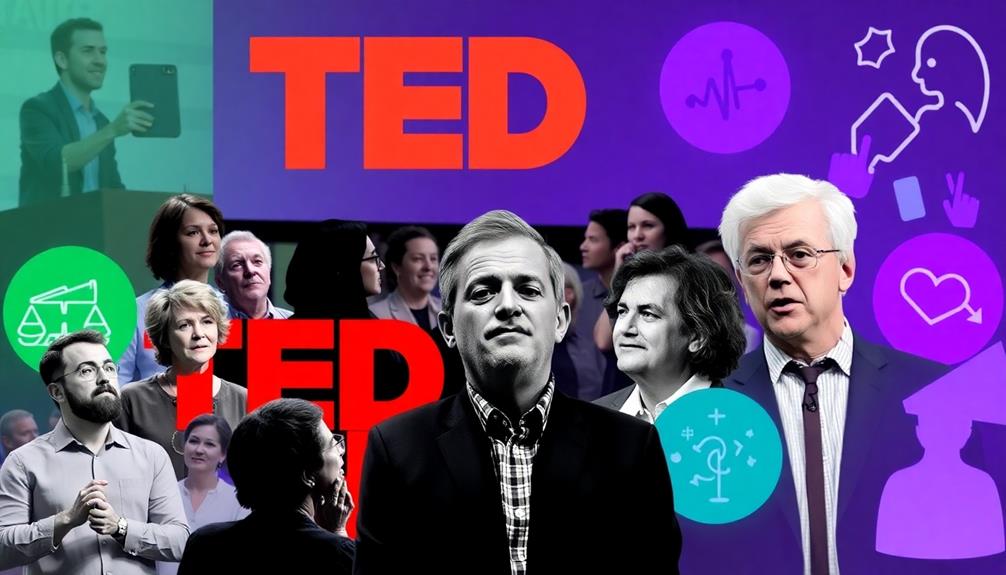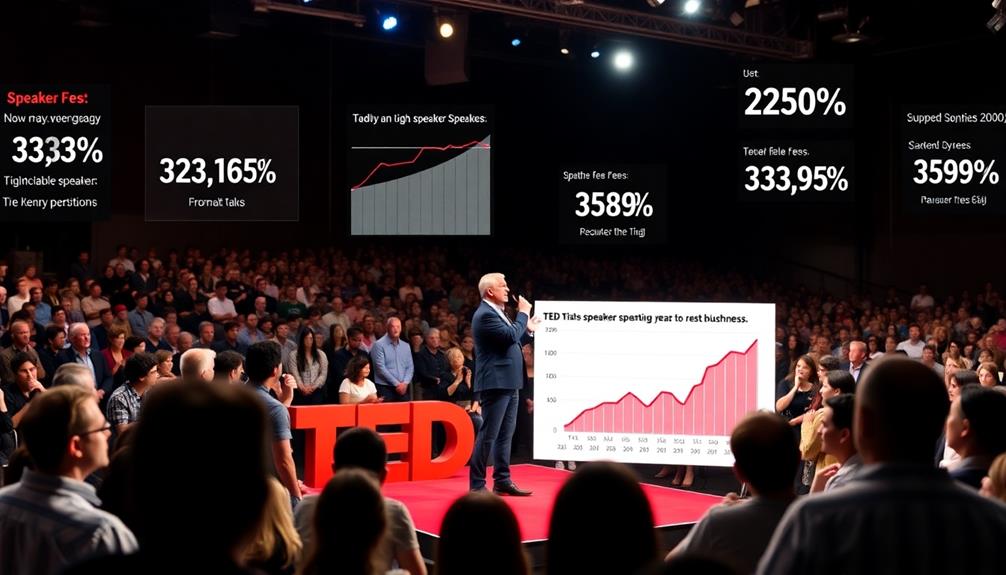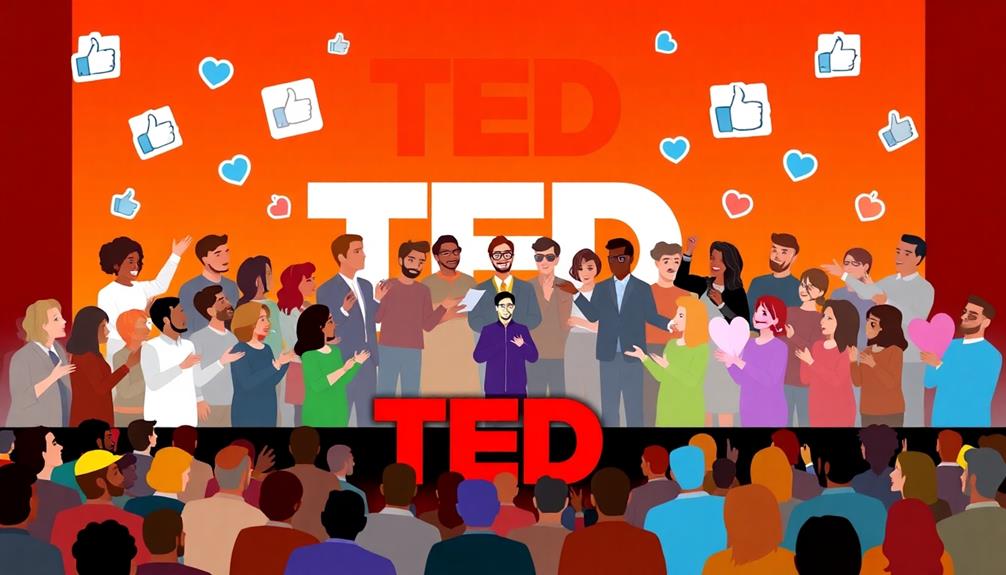Controversial TED Talks spark heated debates by challenging societal norms and provoking deep thought. Speakers like Sarah Silverman faced backlash for offensive language, while Nassim Taleb criticized TED's prioritization of entertainment over intellect. Nick Hanauer's discussion on income inequality was suppressed, igniting petitions for its release. Graham Hancock questioned conventional views on consciousness and drug use, and Rupert Sheldrake's critiques of scientific norms led to polarized reactions. These talks highlight the tension between free speech and censorship, pushing audiences to rethink accepted ideas and ignite important social conversations. You'll find even more fascinating insights on this topic ahead.
Key Takeaways
- Controversial TED Talks, like those by Sarah Silverman and Nick Hanauer, challenge societal norms and provoke discussions on sensitive topics.
- Language choice in talks, particularly by Sarah Silverman, sparked backlash, highlighting the importance of sensitivity in public discourse.
- Nick Hanauer's address on income inequality faced censorship, raising questions about free speech and the impact of partisan views.
- Graham Hancock's exploration of Ayahuasca and alternative consciousness challenged conventional drug norms, igniting debates on mental health and societal perceptions.
- Social media plays a crucial role in amplifying reactions to controversial TED Talks, shaping public perception and mobilizing discussions around contentious ideas.
Overview of Controversial TED Talks
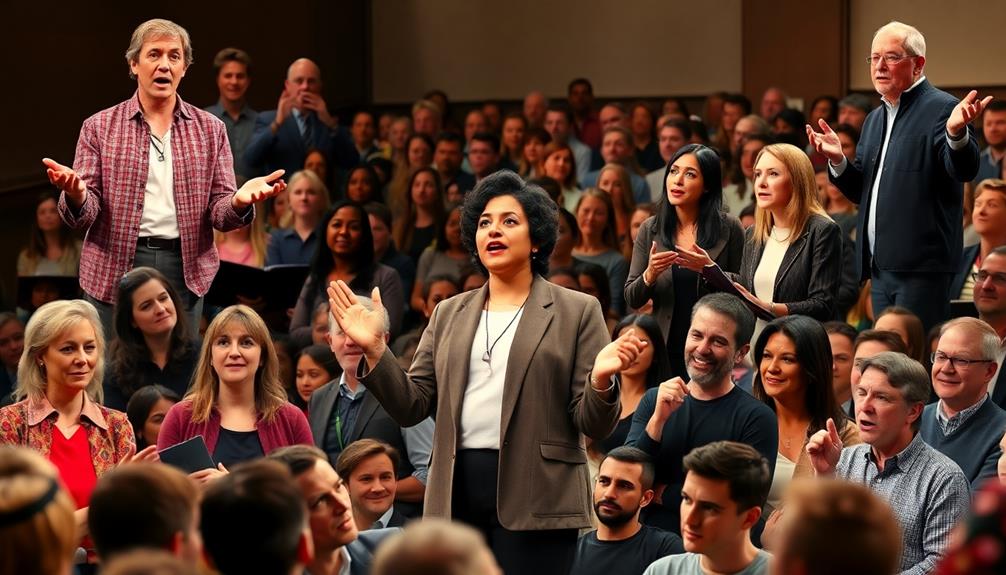
What happens when ideas challenge the status quo? You get banned TED Talks that ignite fierce debates and provoke thought. Controversial talks often highlight uncomfortable truths, and they can stir up strong reactions. These discussions resonate with themes of authenticity and existence as speakers confront societal norms and personal beliefs.
Take Sarah Silverman's 2010 presentation, for instance. Her use of the term "retarded" sparked outrage, showcasing how language can deeply offend while also igniting discussions about societal norms.
Nassim Taleb weighed in on the TED platform itself, calling it a "monstrosity" that prioritizes entertainment over genuine intellectual engagement. Similarly, Nick Hanauer's 2012 talk, "Rich People Don't Create Jobs," faced suppression due to its provocative stance on income inequality, proving that some ideas can be deemed too radical for mainstream acceptance.
Graham Hancock's "The War on Consciousness" presented Ayahuasca as a tool for overcoming addiction, challenging conventional views on substance use and consciousness. Meanwhile, Rupert Sheldrake's "The Science of Delusion" took on established scientific norms, prompting critical discussions about the evolution of scientific thought.
These controversial talks not only push boundaries but also encourage you to question what you think you know.
Impact of Language and Content

Language and content in TED Talks play an essential role in shaping audience perceptions and reactions. The impact of language can be profound, as seen in Sarah Silverman's 2010 talk where she used the term "retarded." This choice sparked significant backlash and hurt many listeners, illustrating how sensitive language can be.
Similarly, Nick Hanauer's 2012 talk, "Rich People Don't Create Jobs," faced initial withholding due to its politically charged content, leading to public petitions advocating for its release. This highlights the tension between controversial ideas and platform curation. In the context of AI discussions, the use of language must also navigate concerns about GPT-4's vulnerabilities, as bias in outputs can color public perception and response.
Graham Hancock's exploration of cannabis addiction and Ayahuasca challenged mainstream views on drug use, further demonstrating the sensitivity surrounding alternative healing methods. Meanwhile, Rupert Sheldrake's "The Science of Delusion" critiqued established scientific norms, provoking discussions about the validity of current scientific paradigms and potential censorship.
Additionally, the backlash against Joe Smith's seemingly simplistic paper towel advocacy emphasizes the importance of depth and relevance in TED presentations. Ultimately, the language and content used in these talks not only convey ideas but also shape the audience's engagement and understanding, making careful consideration essential for impactful discussions.
Audience Backlash and Reactions
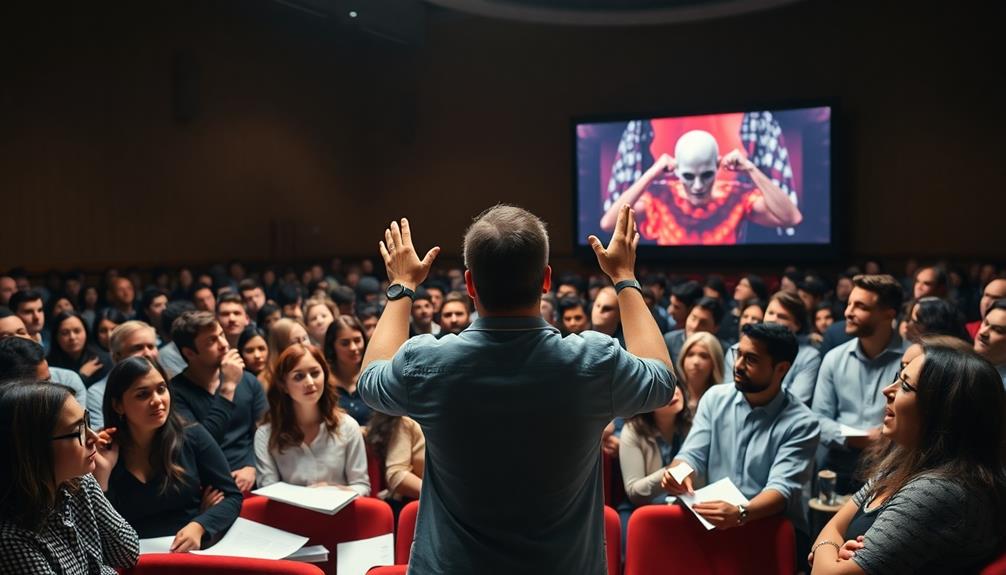
In the domain of TED Talks, audience backlash often emerges as a powerful force that can shape the discourse around controversial topics. Take Sarah Silverman's 2010 talk, for instance. Many listeners were outraged by her use of the term "retarded," deeming it offensive and disrespectful.
Similarly, Nick Hanauer's 2012 presentation, "Rich People Don't Create Jobs," ignited public petitions for its release after it was initially withheld, demonstrating the contentious nature of discussions surrounding income disparity. The growing complexity of societal issues, including those highlighted in talks, often parallels challenges faced in areas like data privacy challenges, reflecting broader concerns about ethical considerations in today's discourse.
Graham Hancock's exploration of alternative consciousness through Ayahuasca also faced skepticism, as audiences questioned the validity of his claims. Meanwhile, Rupert Sheldrake's "The Science of Delusion" prompted polarized reactions by challenging mainstream scientific dogmas, stirring heated debates on the evolution of scientific thought.
These instances highlight how audience backlash can greatly impact the reception of controversial talks. The internal debates within TED itself reflect a broader tension between upholding free speech and adhering to community standards.
As you engage with these talks, consider how your reactions contribute to the ongoing conversation about the boundaries of discourse and the responsibility of speakers in addressing sensitive subjects.
TED's Response to Criticism
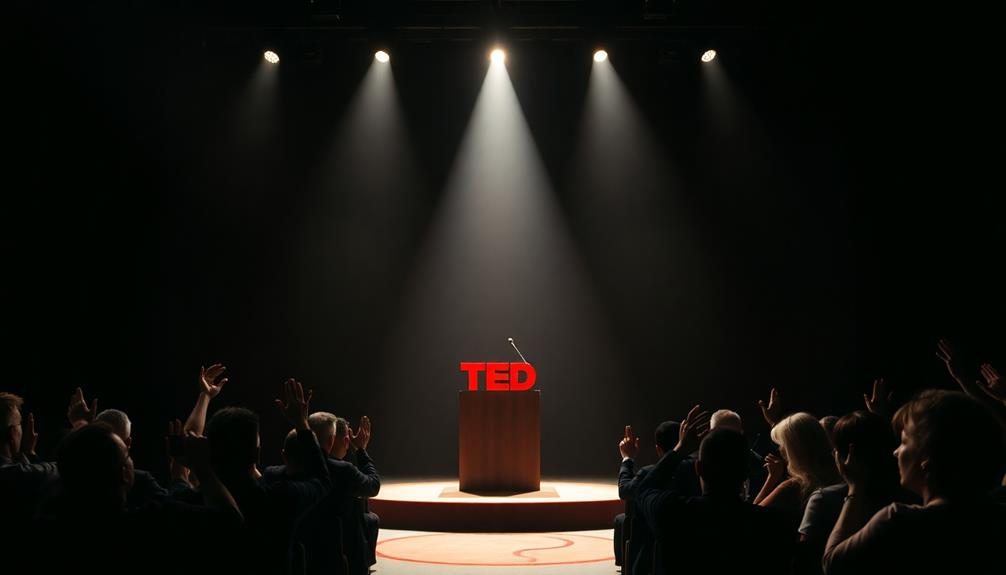
TED has faced significant criticism over the years, prompting thoughtful responses from its organizers. They've had to navigate the fine line between censorship and the need to uphold community standards. For instance, Nick Hanauer's talk on income disparity wasn't banned but deemed underrated, sparking public petitions for its release. TED curators maintain that while they emphasize quality control, they don't formally ban topics, allowing diverse discussions within guidelines.
Here's how TED addresses criticism:
| Issue | TED's Approach |
|---|---|
| Censorship Claims | Open dialogues about mainstream ideologies being challenged. |
| Content Review | Talks flagged by viewers are reviewed by curators. |
| Community Standards | Balances free speech with a commitment to quality. |
| Public Petitions | Responds to audience demands for content reconsideration. |
Through these measures, TED shows its commitment to maintaining credibility and relevance while fostering a vibrant platform for ideas. The ongoing debates reflect a dynamic community endeavoring to engage with a variety of perspectives, even those that spark controversy.
Notable Speakers and Their Ideas
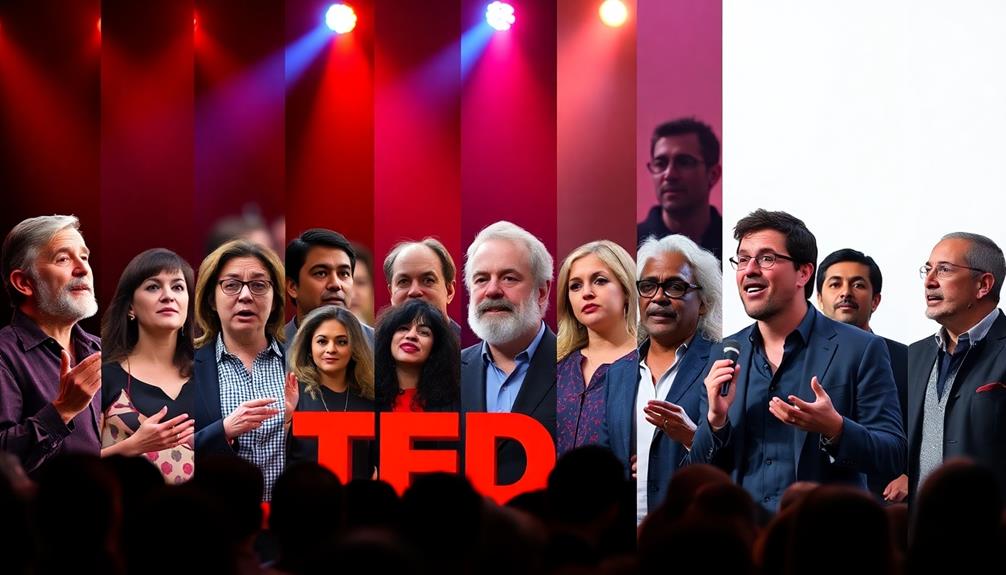
Notable speakers at TED have sparked conversations that challenge conventional wisdom and provoke thought. Richard Dawkins, for instance, dives into militant atheism, questioning the role of faith in modern life and urging you to reconsider entrenched beliefs.
Similarly, Sir Ken Robinson advocates for innovative thinking in education, arguing that traditional systems stifle creativity and calling for a reform that nurtures individual talents.
Nick Hanauer's provocative talk, "Rich People Don't Create Jobs," critiques the misconceptions surrounding job creation and highlights income inequality, prompting public petitions for its release. His insights challenge the status quo and encourage you to rethink economic structures.
Graham Hancock's "The War on Consciousness" investigates cannabis addiction and Ayahuasca, exploring alternative states of consciousness and igniting debates about drug use and societal norms.
Finally, Rupert Sheldrake's "The Science of Delusion" questions mainstream scientific dogmas, promoting free inquiry and urging you to challenge the materialistic worldview that has dominated science for centuries.
These notable speakers not only present innovative ideas but also inspire deeper discussions that resonate beyond their TED Talks.
Themes of Innovation and Challenge

Challenging established norms, controversial TED Talks ignite essential conversations that push the boundaries of thought. Speakers like Rupert Sheldrake question the rigidity of scientific inquiry, sparking discussions about the need for innovation in understanding the natural world. His critique of mainstream scientific dogmas forces you to reconsider what constitutes valid knowledge and encourages a more flexible approach to inquiry.
Similarly, Graham Hancock's exploration of consciousness through Ayahuasca presents a radical challenge to conventional views on drug use and mental health. By promoting alternative states of awareness, he invites you to expand your understanding of human experience.
Nick Hanauer's discourse on income inequality confronts political ideologies that many take for granted, advocating for systemic change. His bold assertions about economic disparity not only challenge societal norms but also inspire discussions about fairness and justice.
Lastly, the backlash against Sarah Silverman's use of offensive humor illustrates the tension between creative expression and community standards. This situation raises questions about the limits of humor in public discourse, demonstrating how innovation in thought can lead to significant challenges regarding societal values.
Censorship and Free Speech Issues
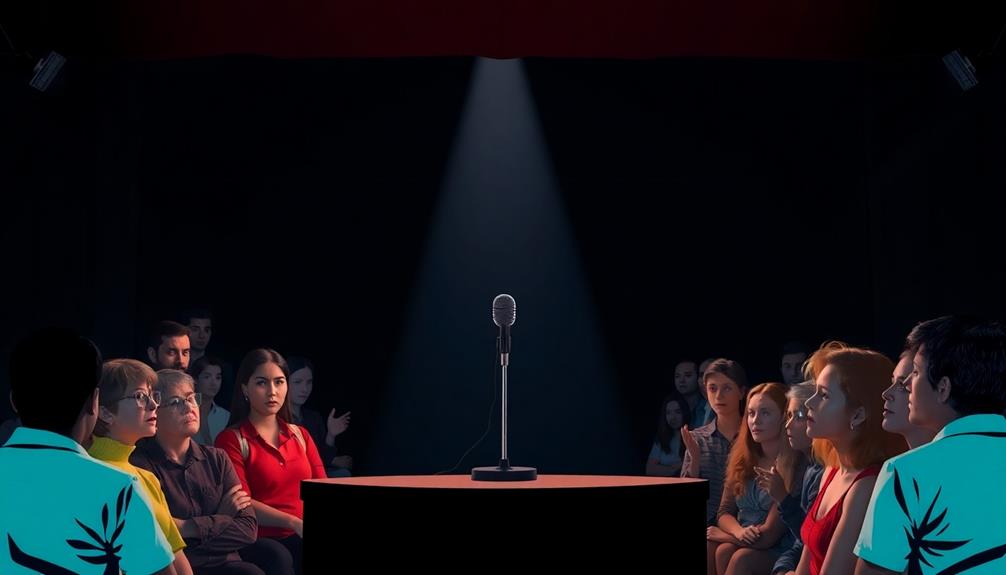
The tension between censorship and free speech on platforms like TED raises vital questions about the boundaries of expression.
You might find it concerning that TED has faced backlash for banning talks that challenge mainstream ideologies, which brings free speech into question. For instance, Graham Hancock and Rupert Sheldrake had their controversial discussions on established scientific paradigms removed, igniting debates about the integrity of the platform.
Similarly, Nick Hanauer's politically charged talk on income inequality was censored, highlighting TED's cautious stance on partisan views.
Moreover, audience reactions to Sarah Silverman's use of offensive language emphasize how TED navigates the fine line between free expression and community standards. When banned talks are re-uploaded, they often stir public controversy, underlining the importance of questioning societal norms through open dialogue.
Consider these key points:
- Censorship can stifle innovative ideas.
- Free speech is essential for societal progress.
- Controversial talks challenge established beliefs.
- Open dialogue fosters understanding and growth.
Navigating the complexities of censorship and free speech remains an ongoing challenge for TED and its audience.
Positive Outcomes From Controversy

Many controversial TED Talks have led to unexpected positive outcomes, turning heated debates into opportunities for growth and understanding. For instance, Nick Hanauer's discussion on income disparity sparked public petitions, raising awareness around socioeconomic issues. Similarly, Graham Hancock's exploration of Ayahuasca prompted discussions on addiction and alternative therapies, encouraging a reevaluation of societal norms.
Here's a look at some more positive outcomes from these controversial TED Talks:
| Talk Title | Controversy | Positive Outcome |
|---|---|---|
| Nick Hanauer | Income disparity and capitalism | Increased awareness and dialogue on socioeconomic issues |
| Graham Hancock | Ayahuasca and consciousness | Reevaluation of societal norms regarding substance use |
| Rupert Sheldrake | Critique of scientific dogmas | Broader debates on scientific thought and free inquiry |
| Sarah Silverman | Language sensitivity in public discourse | Discussions on inclusivity and media language use |
| TEDMED | Health innovation discussions | Advancements in women's health and gender biases |
These examples illustrate how controversial TED Talks can inspire meaningful conversations and drive progress in various fields.
The Role of Social Media

Social media plays an essential role in amplifying diverse voices surrounding controversial TED Talks.
As you engage with these platforms, you'll notice how they shape public perception and mobilize social movements, turning individual opinions into collective action.
This immediate connection not only fuels discussions but also holds content creators accountable for their messages.
Amplifying Diverse Voices
Countless voices are finding their platforms through social media, allowing underrepresented groups to share unique perspectives and challenge mainstream narratives.
By amplifying diverse voices, social media plays an essential role in enriching public discourse. It enables a wider audience to engage with TED Talks, generating conversations that mightn't happen in traditional media.
Consider these key aspects of social media's impact:
- Viral Nature: Talks like those from Nick Hanauer and Graham Hancock can spark debates across vast audiences.
- Real-Time Discussions: Social media creates instant spaces for dialogue, allowing for immediate reactions and diverse interpretations.
- Mobilization Power: Online petitions and campaigns rally support for controversial talks, showing how social platforms can influence public opinion and action.
- Community Engagement: Thousands of comments and discussions foster a sense of community, encouraging collective reflection on often contentious ideas.
In this digital age, social media isn't just a tool; it's a significant conduit for amplifying diverse voices, ensuring that everyone can contribute to the evolving narrative of our society.
Shaping Public Perception
Perception shapes how we comprehend the world, and social media is a powerful force in influencing that perception, particularly regarding controversial TED Talks. These platforms amplify the reach of talks, allowing them to engage a broader audience and spark public discourse on sensitive topics.
For instance, the backlash against Sarah Silverman's talk, which included offensive language, spread rapidly across social media, showcasing its role in shaping public perception and opinion.
Social media also plays an important part in organizing community responses, as seen with public petitions for Nick Hanauer's talk on income inequality. This illustrates how online platforms can mobilize activism and foster discussion around controversial TED Talks.
When Graham Hancock explores consciousness, social media thrives with diverse interpretations and reactions, highlighting the complexity of public perception.
However, social media acts as a double-edged sword for TED. It can elevate speakers' messages, but it also exposes them to criticism, affecting the overall narrative and reception of their talks.
Ultimately, how you engage with these discussions on social media can greatly shape your understanding of the ideas presented in controversial TED Talks.
Mobilizing Social Movements
The rise of social media has reshaped how movements gather momentum and support, transforming the landscape of activism.
Today, platforms like Twitter and Instagram serve as powerful tools for mobilizing social movements, enabling activists to spread information rapidly and connect with a global audience. A prime example is the Arab Spring, where social media facilitated organization and communication among protesters, leading to significant political shifts.
Consider these key points about social media's role in activism:
- Hashtags like #BlackLivesMatter create virtual spaces for awareness and activism against racial injustice.
- Studies link social media activity to increased protest participation, highlighting the correlation between online engagement and real-world action.
- Grassroots movements can gain visibility and impact without relying on traditional media outlets, enabling marginalized voices to be heard.
- Social media fosters a sense of community among activists, uniting individuals around shared causes.
As you navigate this new landscape, remember that social media isn't just a tool; it's a catalyst for change, empowering grassroots movements to rise and make their voices heard in ways that were previously unimaginable.
Lessons Learned From TED Talks
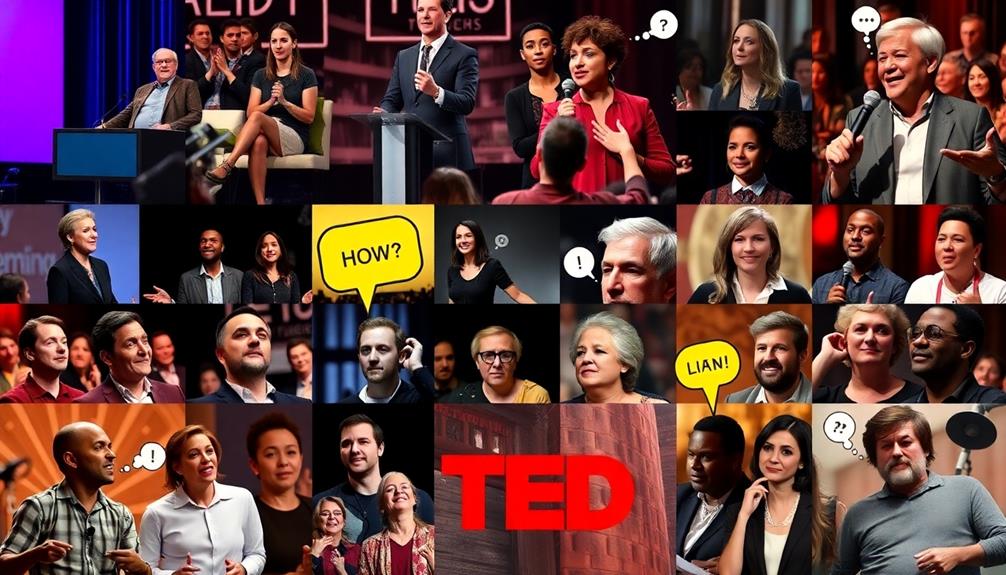
TED Talks offer valuable lessons on how to engage audiences effectively while maneuvering the complexities of controversial topics. You'll notice that those who present controversial presentations, like Graham Hancock and Rupert Sheldrake, often face scrutiny. This highlights the critical need to adhere to scientific validity and recognize audience sensitivities. To navigate these challenges, speakers often rely on proven TED Talk opening techniques, such as starting with a surprising fact, a personal story, or a provocative question to immediately capture attention. By doing so, they set the tone for a thoughtful and respectful discussion, ensuring that even contentious ideas are met with curiosity rather than resistance. Ultimately, a combination of engaging storytelling and credible evidence is key to fostering meaningful dialogue on sensitive subjects.
You should aim to maintain professionalism, especially when using humor or language, as demonstrated by the backlash Sarah Silverman faced for her choice of words.
Moreover, TED emphasizes the importance of rigorous vetting processes to guarantee talks don't promote illegal activities or lack credible evidence. This commitment to quality and integrity reinforces the necessity of presenting well-researched arguments. Engaging and inspiring content is essential for keeping your audience interested; mediocre talks risk scrutiny and potential bans.
To effectively navigate controversial discussions, focus on evidence-based arguments and engage respectfully with diverse perspectives. This approach fosters constructive dialogue and upholds TED's values in sharing innovative ideas.
Frequently Asked Questions
What Is the Most Famous TED Talk of All Time?
The most famous TED Talk of all time is Sir Ken Robinson's "Do Schools Kill Creativity?" Its engaging storytelling and humor resonated with millions, sparking essential discussions about education reform and the importance of nurturing creativity.
What Are the Top 3 TED Talks?
Imagine a world where creativity thrives alongside critical thinking. The top three TED Talks feature Richard Dawkins on faith, Sir Ken Robinson on education, and Brené Brown on vulnerability—each sparking profound conversations and inspiring change.
Why Are TED Talks so Influential?
TED Talks are influential because they tackle complex issues, inspire critical thinking, and present innovative ideas. They engage you in meaningful dialogue, sparking curiosity and encouraging you to explore diverse perspectives on important topics.
What Made TED Talks so Successful?
When it comes to success, TED Talks hit the nail on the head. They mix engaging content, diverse topics, and passionate speakers, creating a platform that inspires you to think critically and spark meaningful discussions.
Conclusion
In exploring the most controversial TED Talks, you realize that debate often fuels progress. These talks challenge norms, sparking conversations that might not happen otherwise. While some ideas may ruffle feathers, they push you to think critically and question assumptions. The backlash and discussions that follow reveal the importance of free speech in fostering innovation. Ultimately, the controversies remind you that exploring uncomfortable truths is essential for growth, both personally and collectively, urging you to engage deeply with diverse perspectives.

